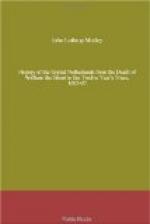As for the stadholder, his vocation was war, his greatness had been derived from war, his genius had never turned itself to pacific pursuits. Should a peace be negotiated, not only would his occupation be gone, but he might even find himself hampered for means. It was probable that his large salaries, as captain and admiral-general of the forces of the republic, would be seriously curtailed, in case his services in the field were no longer demanded, while such secret hopes as he might entertain of acquiring that sovereign power which Barneveld had been inclined to favour, were more likely to be fulfilled if the war should be continued. At the same time, if sovereignty were to be his at all, he was distinctly opposed to such limitations of his authority as were to have been proposed by the States to his father. Rather than reign on those conditions, he avowed that he would throw himself head foremost from the great tower of Hague Castle.
Moreover, the prince was smarting under the consciousness of having lost military reputation, however undeservedly, in the latter campaigns, and might reasonably hope to gain new glory in the immediate future. Thus, while his great rival, Marquis Spinola, whose fame had grown to so luxuriant a height in so brief a period, had many reasons to dread the results of future campaigning, Maurice seemed to have personally much to lose and nothing to hope for in peace. Spinola was over head and ears in debt. In the past two years he had spent millions of florins out of his own pocket. His magnificent fortune and boundless credit were seriously compromised. He had found it an easier task to take Ostend and relieve Grol than to bolster up the finances of Spain.
His acceptances were becoming as much a drug upon the exchanges of Antwerp, Genoa, or Augsburg, as those of the most Catholic king or their Highnesses the archdukes. Ruin stared him in the face, notwithstanding the deeds with which he had startled the world, and he was therefore sincerely desirous of peace, provided, of course, that all those advantages for which the war had been waged in vain could now be secured by negotiation.
There had been, since the arrival of the Duke of Alva in the Netherlands, just forty years of fighting. Maurice and the war had been born in the same year, and it would be difficult for him to comprehend that his whole life’s work had been a superfluous task, to be rubbed away now with a sponge. Yet that Spain, on the entrance to negotiations, would demand of the provinces submission to her authority, re-establishment of the Catholic religion, abstinence from Oriental or American commerce, and the toleration of Spanish soldiers over all the Netherlands, seemed indubitable.
It was equally unquestionable that the seven provinces would demand recognition of their national independence by Spain, would refuse public practice of the Roman religion within their domains, and would laugh to scorn any proposed limitations to their participation in the world’s traffic. As to the presence of Spanish troops on their soil, that was, of course, an inconceivable idea.




